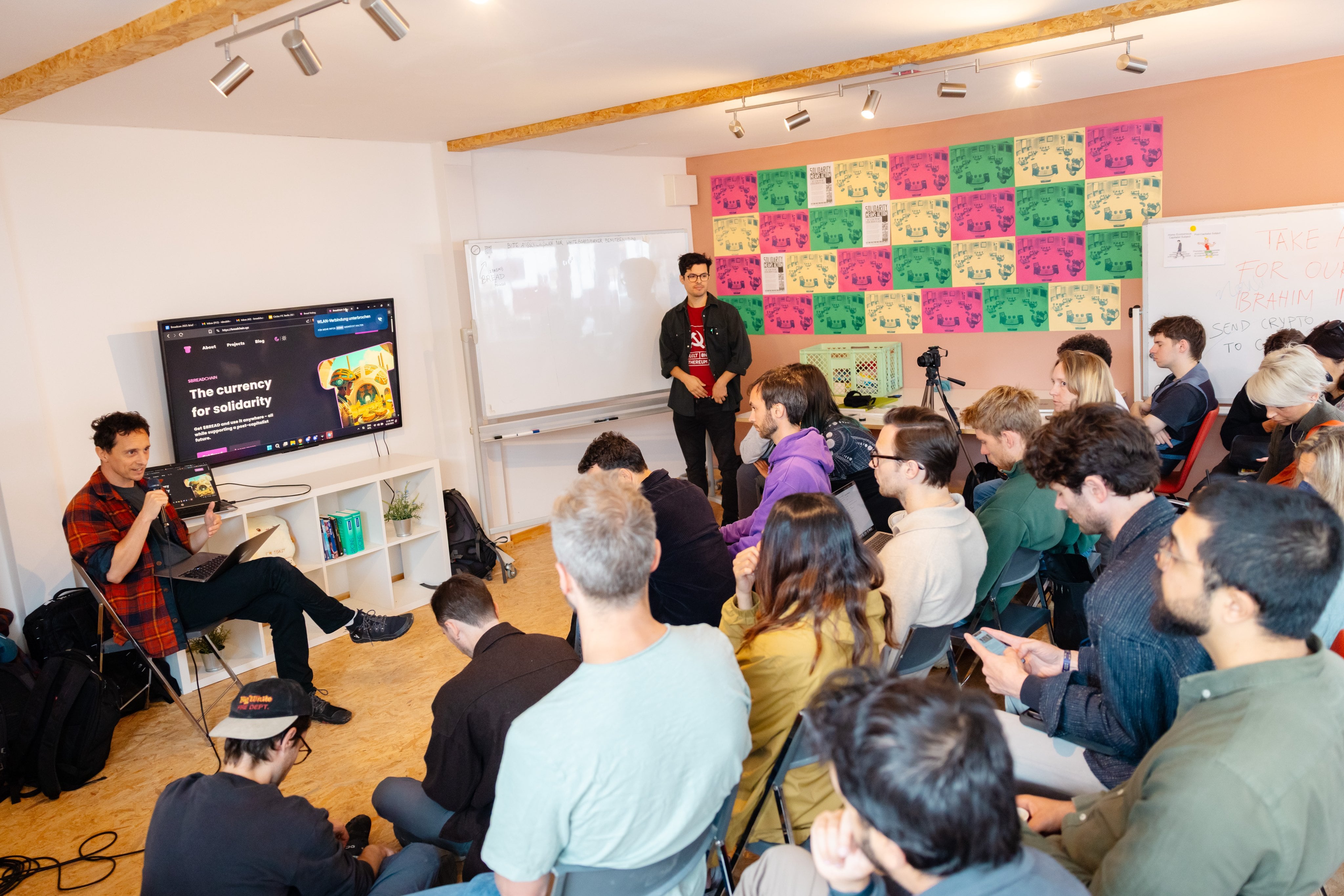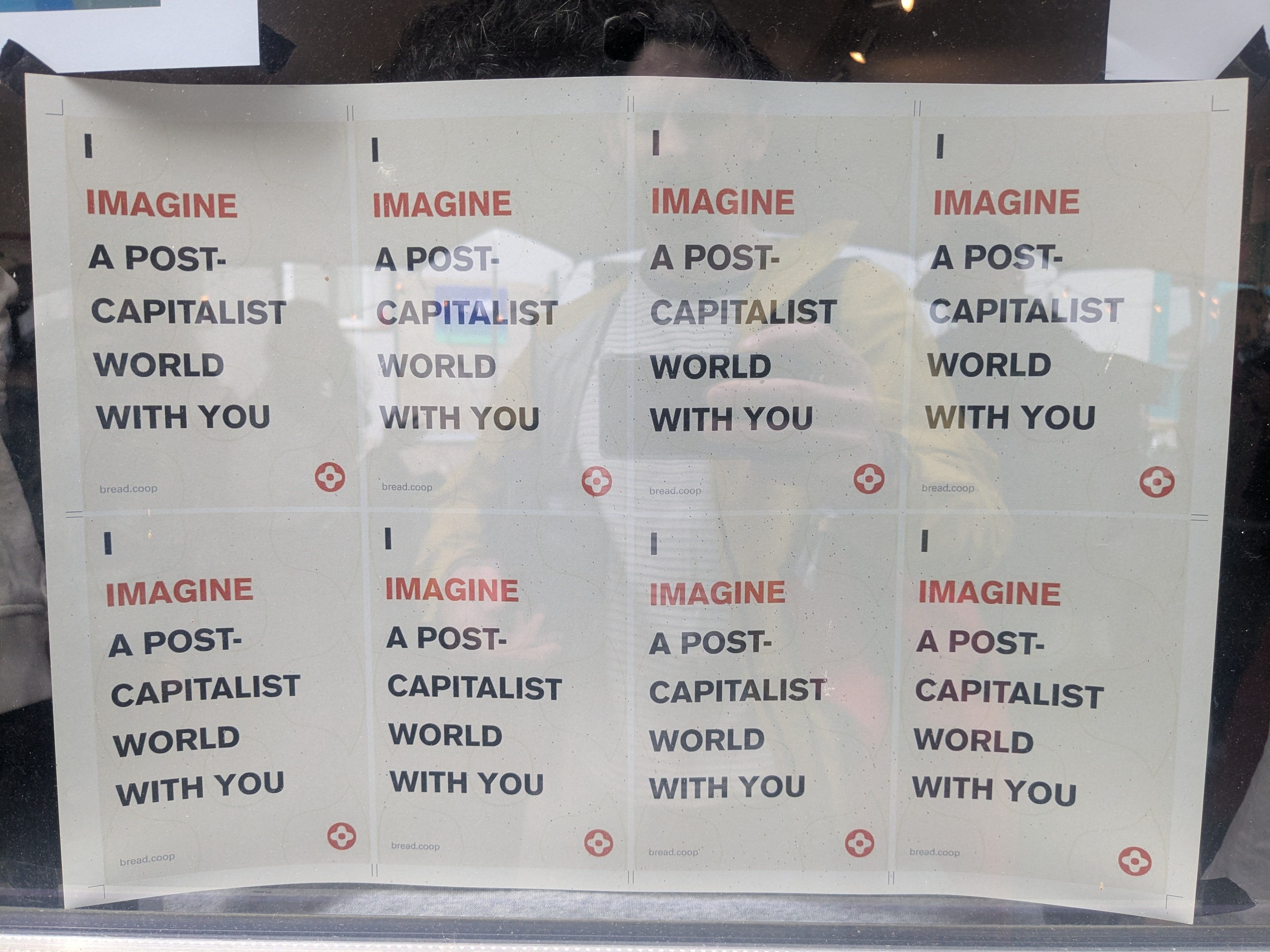Berlin’s blockchain socialists decry memecoin greed and await a ‘post-capitalist world’
0
0

A spectre is haunting the crypto industry. And it isn’t communism — it’s frenzied gambling.
This was the idea under discussion by dozens of builders, technologists, and artists during an event held on Tuesday in connection with Berlin Blockchain Week 2025.
The attendees at Funding the Commons made the case for blockchain technology as a tool for social good, rather than profit-taking.
Moreover, the gathering’s lefty vibe was bracing given the steady alignment of many in the space with the right-wing politics espoused by the world’s most powerful crypto bro — Donald Trump.
“I’m a socialist maxi, rather than a blockchain maxi or crypto maxi,” Joshua Dávila, the founder of The Blockchain Socialist podcast and co-founder of a crypto cooperative called Breadchain, told DL News.
“I’m interested in crypto stuff as it provides tools that we otherwise would not have access to in the past that I think shift certain power dynamics.”
In other words: Out with rug pulls and celebrity token launches.
And definitely out with multi-figure memecoins named after roosters, flatulence, and Lamborghinis.
Redistribution of wealth
Instead, blockchain ventures should support cooperatives, provide humanitarian aid to sanctioned locales, and redistribute the wealth of one memecoin trader to the many, Dávila and his comrades say.

Sprawled out on wooden pallets at the Engelnest coworking space on a cloudy summer day, they gathered to share how cryptocurrencies are critical for delivering aid in Gaza.
Or why spinning up an onchain payroll system in war-torn countries is the real killer app, not memecoins.
The crypto industry has never been a monolith, but every faction has needed its own hefty dose of starry-eyed hopium.
‘We say, ‘Bitcoin is cypherpunk,’ but was it meant to be just that?’
Fatemeh Fannizadeh
Perhaps none more so than the blockchain socialists of Berlin.
Memecoins, or cryptocurrencies that serve no purpose beyond their ties to an internet meme or celebrity, are worth more than $65 billion, according to CoinGecko.
A report by Solidus Labs in May revealed that 98% of tokens deployed on Pump.fun, a Solana-based project that lets anyone launch a memecoin in just a few clicks, were fraudulent.
Despite the clear danger, the hope of quick riches keeps this speculative corner of the industry alive, much to the chagrin of Dávila.
“Why would I work when I can potentially make 10x my money?” he said. “It’s a real question.”
Overnight riches
Not only are they competing against the lure of overnight crypto riches, but they also oppose some of the most powerful figures in the industry.
Brian Armstrong, the billionaire CEO of Coinbase, wrote in January that “the world is waking up to the dangers of Marxism and socialism” and added that it “harms the people it claims to protect the most.”
Satoshi looms large
When Vitalik Buterin, the co-founder of Ethereum, quipped “make communism great again” in February, the vitriol was swift.
“Fuck communism and fuck communists,” Viktor Bunin, Coinbase’s protocol specialist, fired back.
It’s worth remembering that Satoshi Nakamoto, the pseudonymous creator of Bitcoin, envisioned a world in which money and the state had finally been severed.
The libertarian convictions are literally baked into the very code of the $2.1 trillion cryptocurrency.
Sitting atop a tower of pallets and large outdoor cushions on the sidelines of the event’s various workshops, Fatemeh Fannizadeh, an independent crypto lawyer, said the industry is facing yet another crisis of faith.
“Has cypherpunk ever been the end goal? We say, ‘Bitcoin is cypherpunk,’ but was it meant to be just that?” she told DL News.
Fun playground
Even the memecoins are less fun, said Fannizadeh.
She was fascinated by the communities that formed around the early playful memes like Dogecoin, but there has been a marked shift this year.
“It was a fun playground and then some not-so-fun people came and did some not-so-fun things in there,” she told DL News.
“I don’t want to go play in there anymore. It’s not cute anymore.”

The contradiction between crypto’s urge to leave Wall Street and large banks behind and its endless cycle of profiteering is important to these blockchain enthusiasts.
After all, BlackRock, the world’s largest investment bank, is the second-largest holder of Bitcoin after Satoshi, and the US president has teased a stockpile of bright orange “coins” for the government’s safekeeping.
Investment opportunity
Dávila says musing over the early days of Bitcoin isn’t helpful.
“I’m not the biggest fan of Bitcoin, per se,” he said, wearing a red shirt sporting the communist hammer and sickle over a message: “built on Ethereum.”
“Maybe it’s interesting as an investment opportunity. But as far as the political stuff goes, it’s not so important to me.”
Dávila’s Breadchain is one example of using cryptocurrency for more philanthropic purposes.
To join the cooperative, you need to buy the BREAD token. The token is pegged to the dollar and generates yield from the DeFi project Maker.
Instead of users accruing that yield, however, it’s collected by the co-op, and its members decide each month how that money should be used.
Bailed out of jail
Grayson Earle, a digital artist from New York and early member of the Occupy Wall Street movement, said his crypto mining project, founded in 2017, is another example.
Called Bail Bloc, it let users download software onto their computers that mined the private cryptocurrency Monero.
The tokens mined were automatically sent to Earle and his team, who used the money to bail people out of jail, including immigrants detained by US Immigration and Customs Enforcement during Trump’s first term.
‘It was more about wrenching open a space to have a conversation around the prison industrial complex.’
Grayson Earle
He said that after five weeks, the project generated more than $3,000. It shut down after roughly three years when mining cryptocurrencies became harder and more expensive and yielded less profit.
But the money wasn’t the main point.
“It was more about wrenching open a space to have a conversation around the prison industrial complex,” Earle told DL News.
He wrestles with his place in an industry he hardly recognises.

In the early days of the Occupy movement in 2011, when thousands poured into Zuccotti Park in New York’s Financial District to protest economic inequality in the wake of the global financial crash, Earle said Bitcoin was top of mind.
“I remember people talking about it during Occupy,” he said. “This is the answer. Like, ‘Hey, you don’t like banks, here’s something that you can do.’”
Now, things are much different.
“It’s always been embroiled with this gross form of capital accumulation that I thought we were kind of protesting against to begin with,” said Earle.
Liam Kelly is DL News’ Berlin-based DeFi correspondent. Have a tip? Get in touch at liam@dlnews.com.
0
0
 Manage all your crypto, NFT and DeFi from one place
Manage all your crypto, NFT and DeFi from one placeSecurely connect the portfolio you’re using to start.







